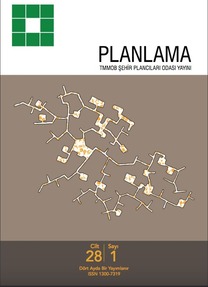COVID-19 Pandemisinin Derinleştirdiği Sosyo-Mekânsal Eşitsizlikler ve Kentsel Alanın Yeni Dinamikleri
Küresel COVID-19 pandemi süreci kentleri ve kentsel yaşamı etkisi altına alırken, neoliberal politikalarla büyüyen kentlerin pandemi mücadelesinde genel olarak yetersiz kaldığı görülmüştür. Kamu yararını görmezden gelen ve kâr odaklı kentleşme politikaları ile büyüyen kentler, eşitsizliklerin ve ayrışmanın en yoğun yaşandığı mekânlar haline gelmiştir. Dolayısıyla, bireyler kentsel mekânda virüsle savaşmada eşit koşullara sahip değildir. Kentlerde var olan eşitsizlikleri ve ayrışmaları derinleştiren pandemi süreci, tasarım ve planlama süreçlerinde ihmal edilen halk sağlığı bakışını öncelikli olarak gündeme getirmiştir. Bu nedenle, halk sağlığını etkileyen ve pandemileri şekillendiren sosyo-mekânsal eşitsizliklerin kapsamlı bir şekilde değerlendirmesine gereksinim duyulmaktadır. Bu doğrultuda, bu çalışma pandemi boyunca yaşanan sosyo-mekânsal eşitsizlikleri ortaya koyarak, kendi kendine yetebilen "20 dakikalık mahalleler" modelini alternatif bir bakış açısı olarak önermektedir. Böylece, halk sağlığı bakışını önceleyen, herkes için adil, erişilebilir, sağlıklı ve yaşanabilir kentsel mekânlar yaratmak mümkün kılınabilir.
Socio-Spatial Inequalities Deepened by the COVID-19 Pandemic and New Dynamics of Urban Space
While the global COVID-19 pandemic process affects cities and urban life, it has been observed that cities growing with neoliberal policies mostly fail to fight against pandemics. Cities that ignore the public interest and grow with profit-oriented urbanization policies have become places where inequality and segregation are experienced the most. Therefore, the people do not have equal conditions to fight the virus in urban space. The pandemic process, which deepens the pre-existing inequalities and segregation in the cities, brought the public health perspective, which was ignored in the design and planning processes, to the agenda as a priority. Thus, the socio-spatial inequalities that affect public health and shape pandemics deserve more reflection. In this regard, this study discusses the pre-existing socio-spatial inequalities experienced during the pandemic and puts forward the self-sufficient "20-minute neighborhoods" model as an alternative perspective. Thus, it may be possible to create fair, accessible, healthy, liveable urban spaces for everyone, prioritizing the public health perspective.
___
- Bayırbağ, M. K. ve Penpecioğlu, M. (2013). Neoliberal Kent ve Görünmeyen Kriz: Kriz Denetimi Stratejilerinin Perdesini İndirmek.
- Balaban, O. (2020). Pandemi Sonrası Yeni Kentsel Çözümler: 15 Dakikalık Kent. Son güncelleme 20 Nisan 2021. https://fikirturu.com/toplum/ pandemi-sonrasi-yeni-kentsel-cozumler-15-dakikalik-kent/.
- Barselona Kent Konseyi. (2016). Establishing Superblocks in Barcelona. Son güncelleme 2 Mayıs 2021. https://ajuntament.barcelona.cat/ecologiaurbana/ sites/default/files/en_gb_MESURA%20GOVERN%20SUPERILLES. pdf Büken, N. 2020. Covid 19 Pandemisi ve Etik Konular. Sağlık ve Toplum Temmuz Özel Sayı, 15-26.
- Castells, M. (1978). City, Class and Power.
- Cittaslow Movement. (2016). Son güncelleme 20 Nisan 2021. https://www. cittaslow.org/content/association.
- C40. (2020). How to build back better with a 15-minute city? Son güncelleme 20 Nisan 2021. https://www.c40knowledgehub.org/s/article/How-tobuild- back-better-with-a-15-minute-city?language=en_US
- Davidoff, T. (2006). Labor Income, Housing Prices, and Homeownership. Journal of Urban Economics, 59(2), 209-235.
- Hacettepe Üniversitesi. (2020). Halk Sağlığı Kavramı. Son güncelleme 18 Ekim, 2020. http://www.halksagligi.hacettepe.edu.tr/hakkinda/kavram. php.
- Hall, S., Massey, D. Ve Rustin, M. (2015). After Neoliberalism?: The Kilburn Manifesto, 9.
- Harvey, D. (2005). A Brief History of Neoliberalism, 2.
- İstanbul Üniversitesi İktisat Fakültesi. (2017). Mahallem İstanbul Projesi. Son güncelleme 28 Ekim, 2020. https://www.istanbul.edu.tr/tr/haber/ istanbullularin-yuzde-20si-kentteki-gelirin-yarisina-sahip-6B00730078 0062004F006E0072004B0039002D0059003100.
- Keil, R. (2020a). The Space and Time a Pandemic Makes. The Planning Review, 56 (3), 4-9.
- Keil, R. (2020b). The “After Time”. How Do We Know What Normal To Plan For? The Planning Review, 56 (4), 4-9.
- Maizland, L. Ve Felter, C. (2020). Comparing Six Health-Care Systems in a Pandemic. Son güncelleme 2 Nisan 2021. https://www.cfr.org/backgrounder/ comparing-six-health-care-systems-pandemic
- Mitlin, D. (2005). Understanding Chronic Poverty in Urban Areas. International Planning Studies, 10(1), 3-19.
- Nieuwenhuijsen, M. J. (2020). Post-COVID-19 Cities: New Urban Models to Make Cities Healthier. Son güncelleme 2 Nisan 2020. https://www. isglobal.org/en/healthisglobal/-/custom-blog-portlet/post-covid-19- cities-new-urban-models-to-make-cities-healthier/4735173/0
- Pala, K. 2020. COVID-19 Pandemisi ve Türkiye'de Halk Sağlığı Yönetimi, Sağlık ve Toplum Temmuz Özel Sayı, 40-50.
- Sağlık Bakanlığı. (2015). T.C.Anayasası 56.Madde. Son güncelleme 18 Kasım, 2020. https://www.saglik.gov.tr/TR,11472/tcanayasasi-56madde. html#:~:text=%E2%80%9CHerkes%20sa%C4%9Fl%C4%B1kl% C4%B1%20ve%20dengeli%20bir,%C3%B6nlemek%20Devletin%20 ve%20vatanda%C5%9Flar%C4%B1n%20%C3%B6devidir.
- The CORE. (2017). The Economy: Economics for a Changing World.
- Türk Tabipler Birliği. (2020). COVID-19 Pandemisi Altıncı Ay Değerlendirme Raporu. United Nations. Fact Sheet No.21, The Human Right to Adequate Housing. Son güncelleme 10 Kasım, 2020. https://www.un.org/ruleoflaw/files/ FactSheet21en.pdf
- Victoria State Government. (2017). 20- minute Neighbourhoods. Son güncelleme 18 Kasım, 2020. https://www.planning.vic.gov.au/policyand- strategy/planning-for-melbourne/plan-melbourne/20-minuteneighbourhoods
- Yavuz Kumlu, K. B., Tüdeş, Ş. Ve Keleş, R. (2018). Komşuluk Birimi Ölçeğinde Yapılı Çevreyi Biçimlendiren Planlama Kararlarına İlişkin Sonuçların Ölçülmesine Yönelik Çok Değişkenli Bir Yöntem Önerisi. Planlama Dergisi, 28(3), 328-347.
- WHO. (2008). Urban Health. Son güncelleme 18 Kasım, 2020. https:// www.euro.who.int/en/health-topics/environment-and-health/urbanhealth/ urban-health
- WHO. (2011). Health Economic Assessment Tools (HEAT) for Walking and for Cycling.
- WHO. (2003). Social Determinants of Health.
- WHO. (2016). Urban Green Spaces and Health.
- WHO. (2017). Health is a Fundamental Human Right. Son güncelleme 18 Kasım, 2020. https://www.who.int/news-room/commentaries/detail/ health-is-a-fundamental-human-right#:~:text=The%20right%20to%20 health%20also,treated%20with%20respect%20and%20dignity.
- Worldometers. (2020). Reported Cases and Deaths by Country or Territory. Son güncelleme 12 Mayıs 2021. https://www.worldometers.info/coronavirus/.
- ISSN: 1300-7319
- Yayın Aralığı: Yılda 3 Sayı
- Başlangıç: 1986
- Yayıncı: TMMOB Şehir Plancıları Odası
Sayıdaki Diğer Makaleler
Tasarımda Değer-Yarar İlişkisi ve Temsil Problemi Üzerine Bir İrdeleme
Murad BABADAĞ, Oğuz HAŞLAKOĞLU
Açık Yeşil Alan Sistemi Planlanma ve Tasarım Süreçlerinde Millet Bahçelerinin Rolü
Türkiye’deki Serbest Planlama Bürolarının Coğrafyası: Mekansal ve Sektörel Analiz
Ahmet Suvar ASLAN, Bilge ÇAKIR
Kentsel Yenileme ile İlgili Yasal Düzenlemelerde Takdir Yetkisinden Gelen Esneklikler
Sezen TARAKÇI, Şevkiye Şence TÜRK
Müştereklerin Çitlenmesi Ekseninde Kadınlar: Ekofeminist Perspektiften Türkiye’de Çevre Hareketleri
